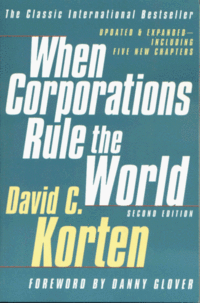- When Corporations Rule the World
-
When Corporations Rule the World 
Author(s) David Korten Language English Publisher Kumarian Press Publication date 1995 ISBN 1-887208-00-3 OCLC Number 32508180 Dewey Decimal 322/.3 20 LC Classification HD2326 .K647 1995 When Corporations Rule the World is an anti-globalization book by David Korten. Korten examines the evolution of corporations in the United States and argues that corporate libertarians have 'twisted' the ideas of free market economist Adam Smith's view of the role of private companies.
Korten critiques current methods of economic development led by the Bretton Woods institutions and asserts his desire to rebalance the power of multinational corporations with concern for environmental sustainability and what he terms “people-centered development”. He advocates a 50% tax on advertising to counter-attack what he calls "An active propaganda machinery controlled by the world's largest corporations constantly reassures us that consumerism is the path to happiness, governmental restraint of market excess is the cause of our distress, and economic globalization is both a historical inevitability and a boon to the human species." [1]
Korten criticises consumerism, market deregulation, free trade, privatization and what he sees as the global consolidation of corporate power. Above all he rejects any focus on money as the purpose of economic life. His prescriptions include excluding corporations from political participation, increased state and global control of international corporations and finance, rendering financial speculation unprofitable and creating local economies that rely on local resources, rather than international trade.
In an article entitled "A Corporate Believer's Turnabout" which appeared in the New York Times on November 25, 2001 writer Suzanne McCoy noted that Korten already practised what he preached in the book. "The Kortens live on Bainbridge Island, Wash., a spot in the Puget Sound near Seattle that Dr. Korten calls the 'land of ecotopia.' He can practice some of his suggestions here, he said, like buying wine from producers he knows personally." [2]
In a review of the book in Left Business Observer #71 in January 1996, Doug Henwood observed that Korten "offers a vision of 'a market economy composed primarily, though not exclusively, of family enterprises, small-scale co-ops, worker-owned firms, and neighborhood and municipal corporations.' Much of this is desirable. But it would be impossible to run a complex economy on this scale only; it's easy to imagine furniture being made this way, but not trains and computers. If Korten means to do away with trains and computers, he should tell us." [3]
References
- ^ "David Korten Quotes :: Quoteland :: Quotations by Author". Quoteland. http://www.quoteland.com/author.asp?AUTHOR_ID=1910. Retrieved 2010-08-19.
- ^ By J. Suzanne Mccoy (2001-11-25). "A Corporate Believer's Turnabout". NYTimes.com. http://www.nytimes.com/2001/11/25/business/25PROF.html?pagewanted=all. Retrieved 2010-08-19.
- ^ "Antiglobalization". Leftbusinessobserver.com. http://www.leftbusinessobserver.com/Globalization.html. Retrieved 2010-08-19.
External links
- Stylus/Kumarian Press - When Corporations Rule the World 2001 Second Edition, 408 pp.
Categories:- 1995 books
- Environmental non-fiction books
- Economics books
- Anti-globalization
- Books about multinational companies
Wikimedia Foundation. 2010.
